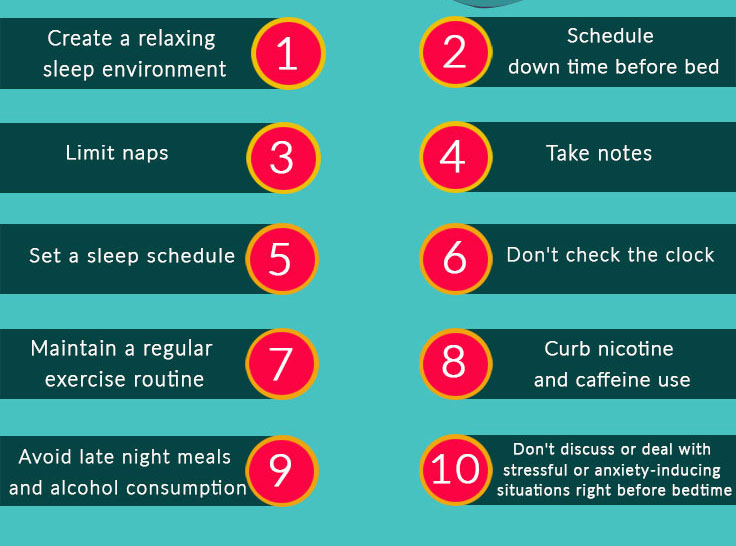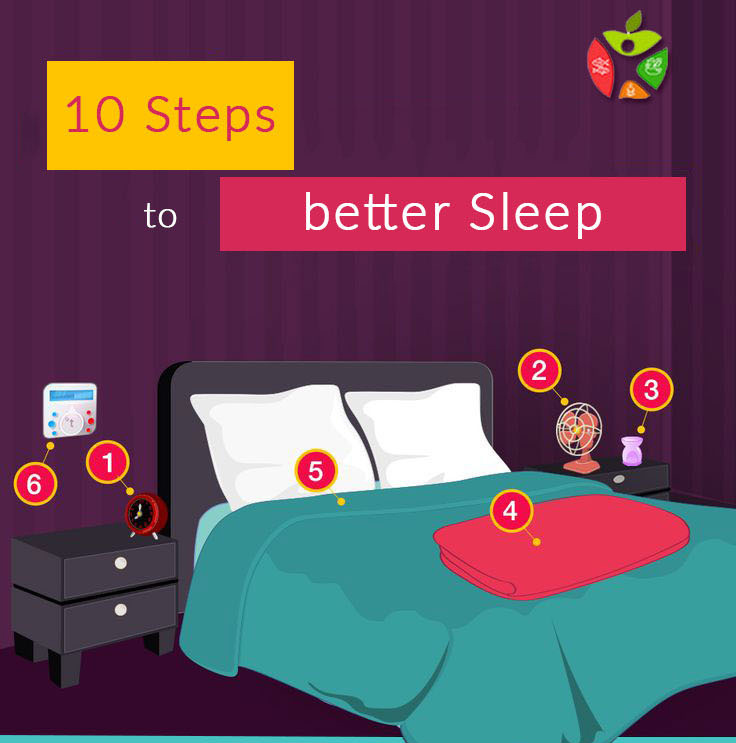10 steps to better Sleep
People experience insomnia because they develop a pattern of behaviour that interferes with good sleep habits. Sleeping difficulties are often connected to underlying problems such as stress, depression or anxiety.Sometimes, some medical issues may be contributing to sleep difficulties. It is then a good idea to consult a physician or another medical professional. Seeing a psychologist may also help you address sleep problems. Psychologist can help in changing certain behaviours and amnaging. It is a good idea to consult with a physician or another medical professional to learn if medical issues may be contributing to your sleep difficulties and treat related medical
problems. Seeing a psychologist may also help you address sleep problems. Psychologists can help people change their behaviours and manage the thoughts, feelings and emotions that can interfere with a healthy night’s sleep. Licensed psychologists have the professional training and skills to treat individuals suffering from depression and anxiety, which have been linked to sleep problems like insomnia.In working with a psychologist, you can expect to talk about your overall physical and emotional health, and your health beliefs and behaviours. A psychologist will help you identify any underlying stressors and behaviours that may be interfering with sleep.A psychologist may ask you to keep a sleep diary with information about your routines and behaviours. This can help the psychologist identify patterns of behaviour that might be interfering with sleep. For instance, if you have a habit of exercising at night or watching television in bed, your psychologist can help you take a look at how your routines impair sleep, and help you find alternatives. The psychologist may also teach you relaxation techniques to help you learn to quiet your mind and unwind before bed.Depression and Sleep
Depression is one of the most common mental illnesses. More than 16 percent of Americans experience major depressive disorder during their lifetime, according to the National Institute of Mental Health. Though a clear-cut statistical data is not available about sleep disorders in India, the percentage of people suffering from it is not likely to be grossly different. Also, depression and sleep problems often go hand in hand. Many people with depression experience hypersomnia, this is a condition in which they sleep more than normal. On the other end of the sleep spectrum, insomnia is also common among people with depression. In fact, research suggests that people with insomnia are 10 times as likely to suffer from clinical depression.
Some people develop sleep problems first, and then go on to experience depression. In others, depression occurs before signs of sleep disorders. In either case, sleep difficulty is just one of many reasons to seek treatment for depression. Depressed people typically feel hopeless and guilty. They often lose interest in routine activities and withdraw from family and friends. They may have thoughts of suicide. Treatment can address both depression and
the sleep problems that go along with it.
What is Insomnia?
Insomnia is a common sleep disorder that occurs in 30 million Americans, according to the Institute of Medicine. A person with insomnia has trouble falling or staying asleep.
When sleepless nights persist for longer than a month, the problem is considered chronic. Often, people with chronic insomnia see the problem come and go, experiencing several days of good sleep followed by a stretch of poor sleep.
Studies show that people with insomnia who learned to recognize and change stressful thoughts slept better than those who took sleeping pills to treat their insomnia.
Whatever the cause, you’re more likely to rest if you adopt healthy sleep behaviours. Much like diet and exercise, sleep is a basic building block to health.
Steps to Better Sleep
Consider the following steps that can be helpful in changing unhealthy habits and improving
your sleep.


